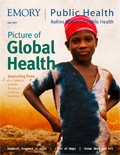A Cross-fertilization of Ideas
For Humphrey fellows, learning builds local and global connections
By Stone Irvin
|
Picture of Global Health |
Getrude Ncube is a millionaire. So is every other citizen of Zimbabwe. Hyperinflation in the East African country is so bad that a paycheck's value can plummet on the trip to the bank.
But the midwife from Harare, who recently completed a Humphrey fellowship at the RSPH, yearns for home, where her family and job with the Ministry of Health and Child Welfare await. Once there, she faces a mammoth task: working to implement networking strategies to track patients with HIV/AIDS to provide them with follow-up treatment and counseling.
Humphrey colleague William Ako Takang also has a family and livelihood in Africa. A specialist in obstetrics and gynecology from Cameroon, Takang has a deep interest in the prevention of mother-to-child transmission of HIV as well as a passion to halt a different kind of inflation prevalent in his country: an escalating maternal mortality rate.
Takang wears a kind smile despite the enormity of the problems he has chosen to tackle. Thanks to his Humphrey fellowship, he is brimming with ideas to improve patient care in his homeland, including the implementation of electronic medical records to track patients and a project to provide expectant mothers with counseling to reduce the number of septic abortions.
"I've already had talks with partners in the United States who are going to participate in my project," says Takang.
Philip Brachman has neither family nor business in Africa. As with all of the fellows, he has become a major part of Takang's life as coordinator of the Hubert H. Humphrey Fellowship Program in the RSPH.
30 years and counting
President Jimmy Carter established the program in 1978 to honor the late U.S. vice president and senator for his long-term advocacy of international cooperation. Administered by the Institute of International Education (IIE), the annual program selects 160 mid-career professionals in all disciplines from developing countries who are assigned to one of 15 U.S. campuses. The J. William Fulbright Scholarship Board chooses the finalists from a pool of 500 applicants. Last year, the RSPH hosted 10 fellows from Saudi Arabia, Sierra Leone, the Republic of Georgia, Sri Lanka, Nigeria, Burma, Romania, China, Cameroon, and Zimbabwe.
Brachman has guided the fellows since 1993, when Emory was designated as a host campus. In his 16 years coordinating the program, he has worked with 166 fellows from 75 countries.
He has spent the time securing resources for the fellows, assisting them with housing and basic necessities. Five years ago, Brachman instituted a program with the help of two anonymous donors to provide funds for laptop computers for the fellows. Today, the program continues to provide funding, as does IIE, so that all fellows can purchase laptops for communicating with Emory faculty, friends, and Humphrey alumni when they return home.
"It's important for the fellows to stay in touch and maintain the links that the program nurtures," says Brachman.
A living tribute to its founder
As set forth by President Carter, the Humphrey Fellowship Program fosters relationships between the United States and other countries built on mutual understanding and interaction. Thus Brachman encourages the fellows at Emory to travel as much as possible.
Every year, Brachman accompanies the fellows to Plains, Georgia, to visit the Jimmy Carter National Historic Site and invites the former president to meet them. This past year, Carter invited them to a revival service at his church.
"We were filled with lots of emotions when we met him," says Takang. "We were thankful for his foresight on health and human rights."
In addition to meeting Americans from Emory and across the nation, the fellows learn from each other, sharing experiences from their home countries. "There is a great cross-fertilization of ideas," says Ncube.
The cross-cultural learning and the professional experience that fellows gain serve them and their constituents well, says Brachman. They land jobs in international health and tend to advance quickly up their respective professional ladders. Fellows like Ncube and Takang return home full of fresh ideas and helpful contacts who are ready and willing to provide them with the support they need.
"It's a fantastic program," says Brachman, "Carter had such vision in setting it up. It's quite a living tribute to him."
Stone Irvin is a journalism student at the University of Georgia. The Humphrey Fellowship Program, founded by President Carter, marked its 30th anniversary in 2008.


